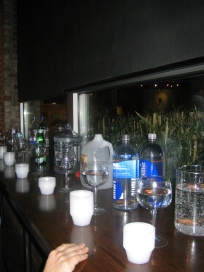Feb. 25, 2008
We wake up in Raleigh at an uncomfortably early hour to pack the car and head out for Atlanta, Georgia. Late that afternoon we arrive in time to meet with Chris Owens at the Counter Culture training center in Atlanta. The space is beautiful – a coffee fans fully loaded, well lit, wood floored, clean, workspace (not that wood floors have anything to do with good coffee, but we appreciate them).  Chris told us about Counter Cultures free training programs and we talked at length about purchasing contracts, relationship trade and direct trade. There is a growing movement towards these forms of trade.
Chris told us about Counter Cultures free training programs and we talked at length about purchasing contracts, relationship trade and direct trade. There is a growing movement towards these forms of trade.
Relationship Trade, Fair Trade and Direct Trade are all structures that work to create a more equitable exchange of money for goods. What this means is that more money is making it back to the people who are laboring to produce the coffee beans. The general idea is to build close professional relationships with people in as many stages of the trading process as possible; farmers, coffee farming cooperatives, importers, roasters and consumers. We, CoffeeInAction, believe the ideal situation would be to know the owner of the farm and be able to purchase and import green beans (un-roasted coffee) directly from the farm. While this is the ideal, for many reasons this is not always possible.
One example of a relationship or direct model is when the roaster and farmer agree on a price for an amount of coffee. The roaster then calls an importer (who s/he would have a relationship with) and asks for that shipment to be placed. The importer is paid enough money by the roaster to cover processing fees plus a profit margin, and the beans are shipped. A small number of businesses have been able to adopt this model of trade. Throughout our trip we have seen that this concept is expanding within the field.
Almost all coffee that enters the US does so through a coffee importer/distributor. Over time a coffee distributor will learn that certain roasters are looking for certain kinds of coffee. The importer will learn more about that kind of coffee, what farms are working that way, and develop relationships with coffee farming cooperatives or individual farms that meet these requests. Sometimes after a relationship is formed this way, the loop is completed when the roaster is able to travel to origin and meet the farmers whose beans they have been roasting.
At this point many people have heard of Fair Trade: be it coffee, tea, chocolate, honey, rice, the list goes on. Fair Trade is a label given to things that have been certified by Transfair USA. On the transfair website the mission states “TransFair USA enables sustainable development and community empowerment by cultivating a more equitable global trade model that benefits farmers, workers, consumers, industry and the earth. We achieve our mission by certifying and promoting Fair Trade products.” The Specialty Coffee Association of America (SCAA) states “Fair Trade Certification has proven to be a valuable tool in providing integrity and transparency to coffee commerce and in building consumer demand for Fair Trade coffee. SCAA also recognizes that there are other ways for members to promote the concepts of equitable trade, sustainability and transparency.” As we learn more about equitable trade, we are learning how specialty coffee business around the U.S. are incorporating one or more of these concepts into their own company.
Counter Culture has a direct relationship with many coffee farms. An essential difference between relationship trade and conventional trade is the nature of the contracts. Chris explained to us that Counter Culture relationships intend to create contracts with individual farms or cooperatives to ensure that labor costs are covered, as well as the price of coffee for that season.
 (but from what we hear Atlantans don’t do much walking). M’Lissa Muckerman hosts a cupping every other Monday night. On the off weeks she organizes tastings, studies, and other events. That evening a water tasting was taking place. We observed, smelled, tasted and described water treated or sourced 8 different ways: filtered tap water, spring water, glacial water, mineral water, reverse osmosis, double-distilled, processed water, and soda water. The descriptions of the water and the event are artfully presented at M’lissa’s blog:
(but from what we hear Atlantans don’t do much walking). M’Lissa Muckerman hosts a cupping every other Monday night. On the off weeks she organizes tastings, studies, and other events. That evening a water tasting was taking place. We observed, smelled, tasted and described water treated or sourced 8 different ways: filtered tap water, spring water, glacial water, mineral water, reverse osmosis, double-distilled, processed water, and soda water. The descriptions of the water and the event are artfully presented at M’lissa’s blog:
-Sara Rose and Melanie